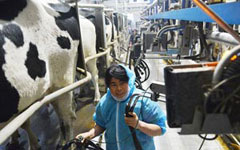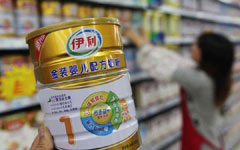Dairy product imports 'to witness sharp rise'
By He Wei in Shanghai (China Daily) Updated: 2014-03-05 09:02It is also more costly to produce raw milk in China compared with other dairy heavyweight nations, the study noted. The price of corn, an essential grain for cows, is 20 percent higher in China than in the United States. Other key ingredients, such as hay, are 60 to 70 percent more expensive.
China's expanding urbanized population is driving sales of dairy products, which market research firm Frost & Sullivan projects will double from the present $45 billion to $89 billion by 2017.
|
 \ \ |
|
 |
China imported 1.52 million tons of dairy products from January to November 2013, up 35.7 percent, according to data from the General Administration of Customs. New Zealand made up the lion's share, at 86 percent, of all imports.
The over-reliance on exports has made China vulnerable to quality loopholes from foreign dairy vendors. The food safety regulatory administrations of China and New Zealand signed an agreement in early November to strengthen cooperation in food safety and quality, three months after elevated levels of nitrates were found in New Zealand milk exports.
To restore customer confidence and fend off foreign competition, the Ministry of Industry and Information Technology said in October it aimed to reduce the number of domestic milk powder manufacturers to 50 from 127.
The government vowed to nurture 10 large-scale dairy entities with an annual income of more than 2 billion yuan to make up in excess of 70 percent of the market in five years.
Inner Mongolia Yili Industrial Group Co Ltd, China Mengniu Dairy Co Ltd and Bright Dairy & Food Co Ltd hold a dominant share of the milk industry as larger operators seize control of the market and scoop up smaller players, according to estimates from Euromonitor International.
A severe shortage of raw milk in China will force companies to step up consolidation along the value chain. In 2013, the supply shortage exceeded 4 million tons compared with 1.7 million tons in 2010, consultancy Fitch Ratings said in November.
A pickup in mergers and acquisitions among dairy companies to tap the growing demand from customers as disposable incomes grow and the government relaxes its one-child policy is also predicted by experts.
Shi Jing contributed to this story.
 |
 |
- Top 10 Chinese youth's favorite seaside resorts
- Yili sets up R&D center in Europe
- In new move, Feihe to acquire goat milk firm
- More dairy cooperatives will guarantee milk safety: experts
- Feihe Dairy plans to acquire 70% of Guanshan
- Danone to become second-largest shareholder of Mengniu
- Dairy firms looking at M&As
- NHTSA says finds no 'defect trend' in Tesla Model S sedans
- WTO rare earth ruling is unfair
- Amway says 2014 China sales may grow 8%
- President Xi in Europe: Forging deals, boosting business
- CNOOC releases 2013 sustainability report
- Local production by Chery Jaguar Land Rover this year
- Car lovers test their need for speed in BMW Mission 3
- China stocks close mixed Monday

















